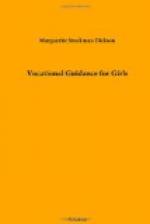Or suppose she fails to indorse the teacher’s course. We have always been led to expect that this failure ruins forever the teacher’s influence with the child. There are some of us, however, who doubt the immediate destruction of a wise influence, even if we should say, “No, I do not think I should have punished you in just that way. But perhaps you have not told me all that occurred. Or perhaps you overlook the fact that you had annoyed Miss —— until, being human like the rest of us, she lost her temper. Is it fair for you to treat your teacher in such a way that you cause her to lose her self-control?” It is usually possible for the wise mother to turn her fire upon the child’s own error without outraging the childish sense of justice by indorsing something which does not really deserve indorsement.
There is, perhaps, no way in which the mother of a family can do so much for the community institutions as by keeping up her own interest in them and thus stimulating the other members of the family to a willingness to do their part in the work of uplift. Where everybody is really interested and working, the first great stumbling block in the way of public enterprises has already been surmounted.
In the case of the school, however, the well-trained mother will find additional work to do. We who have been teachers know how vainly we have sought for intimate acquaintance on the part of parents with the school. And we who have been mothers know something of the difficulties in the way of gaining such intimate acquaintance. In spite of, or perhaps because of, my long years of schoolroom experience, I am quite unable to conquer my reluctance to knock at a classroom door. There is an aloofness about being a school visitor which most mothers feel and few enjoy. However, it is possible to gain so much of sympathetic understanding by persistent visiting that I have found it worth while to disregard my reluctance.
So often we hear mothers say, “I try to visit school at least once each year.” I wonder if they ever think of that one visit as an injustice to the teacher? Suppose that, as is quite probable, the visitor arrives at an inopportune moment, finding the children in the midst of work which won’t “show off,” or the air heavy with the echoes of a disciplinary encounter, or the children restless as the session draws to a close, or dull and listless from the heat of an unusually hot day. What the visitor needs to do is not to visit once a year, but to get acquainted with the school as she does with her next-door neighbor or her mother-in-law. Having done this, she may attend the meetings of the parent-teacher association with a consciousness of knowing something of the problems to be met and solved. Until she has formed such acquaintance she deals with unknown quantities and is therefore in danger of erroneous conclusions.
[Illustration: Mothers visiting a school garden. Mothers need to visit the schools often in order to know something of the problems to be met and solved by the teachers]




